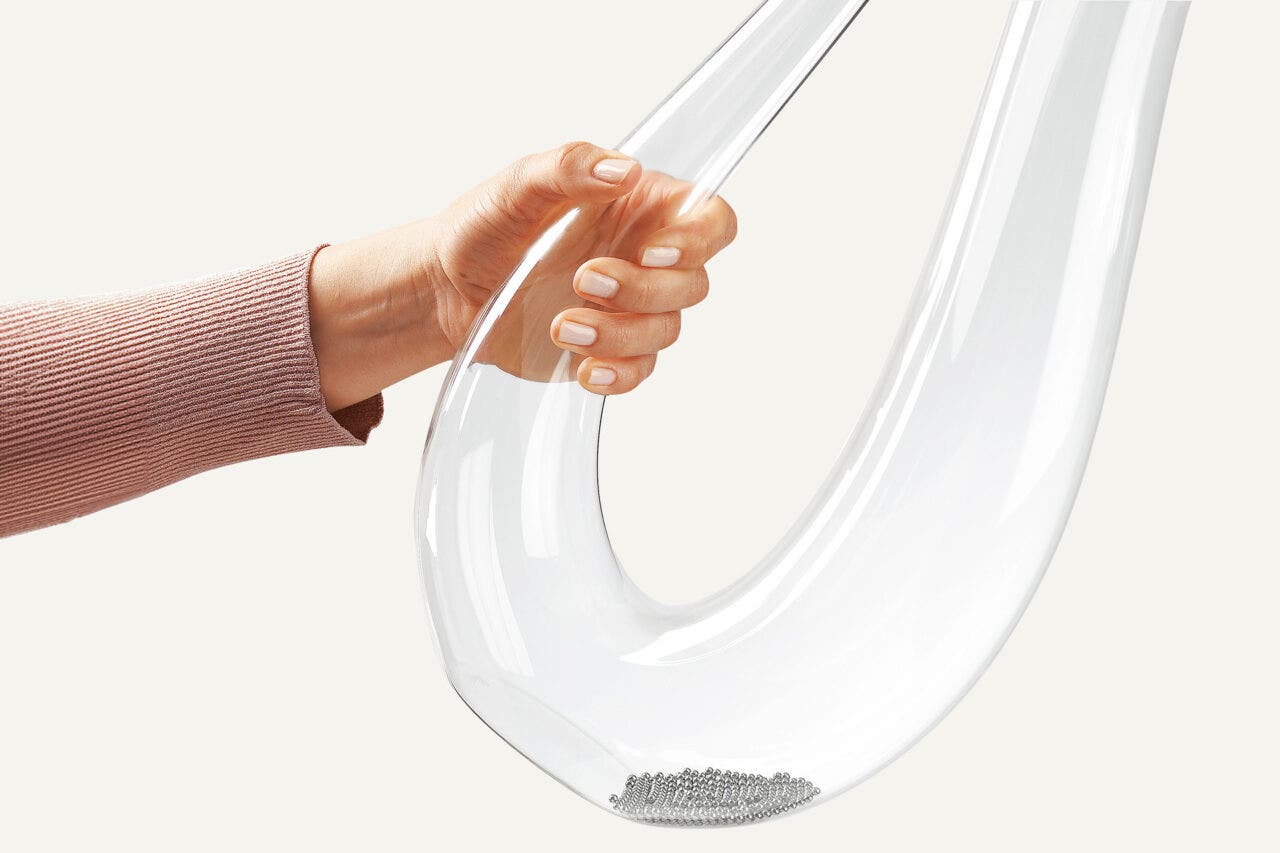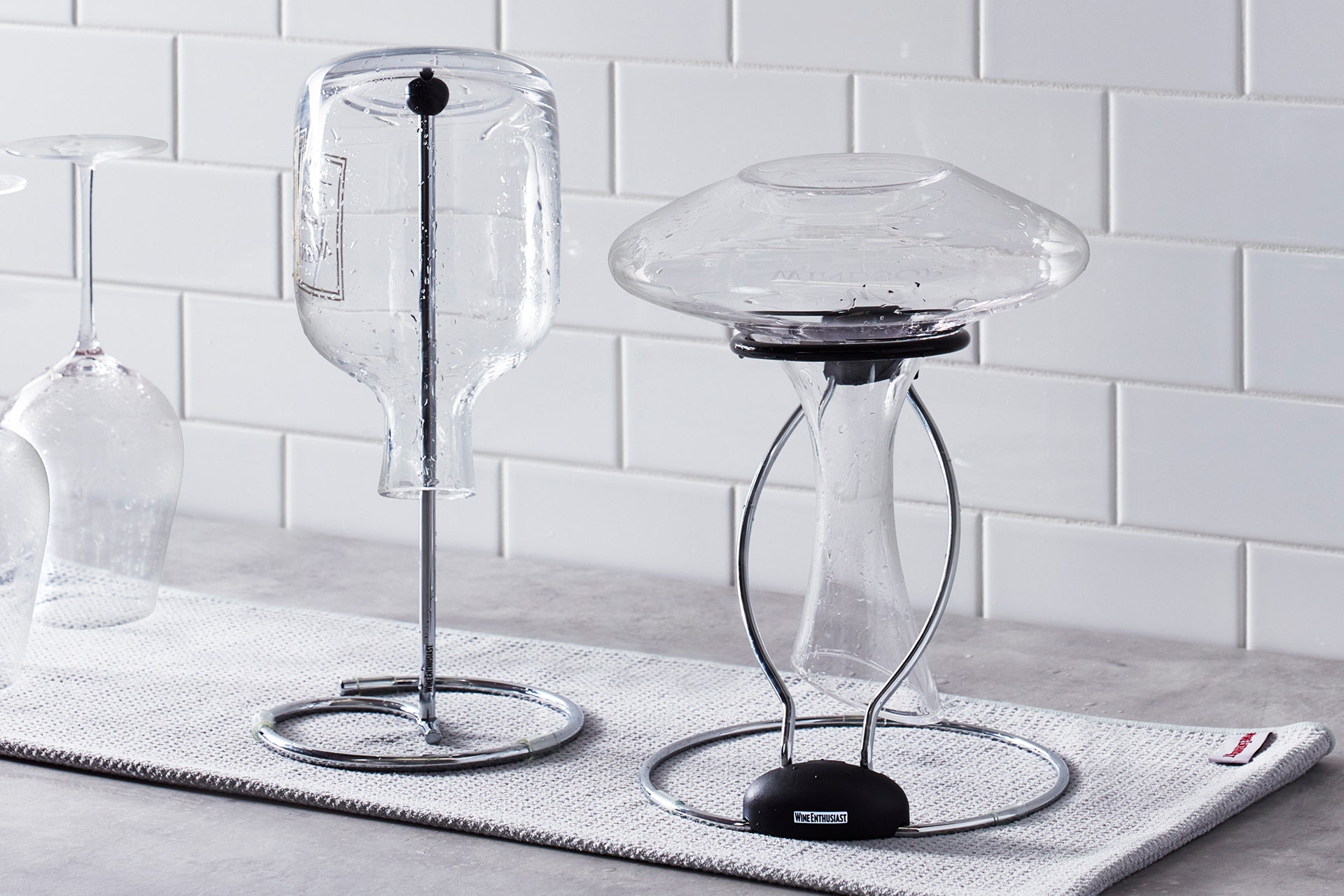Apologizing to your downstairs neighbors is probably the first thing you should do after a raucous dinner party. When it comes time to clean dishes, however, there’s an array of options, especially for that fancy decanter you trotted out for the occasion.
Should you rinse it with vinegar? Scour it with salt? Invest in cleaning beads? Or even, drop that wine-stained decanter in the dishwasher, say a quick prayer and move on with your life?
It all depends on the size, shape and overall preciousness of your decanter.
We asked five wine industry experts about the pros and cons of each method. Life is short, after all, and good glassware is expensive.
You May Also Like: The Best Wine Decanters for Every Occasion
Vinegar and Water
It might be tempting to wash a decanter as you would most other glasses, with dish soap and warm water in the sink or dishwasher. That’s frowned upon by wine pros, however. Dish soap leaves behind residue and faint flavors, while dishwashers are too rough for most decanters.
“I was always trained to never use soap in a decanter,” says Thea Angella Merl, experience curator and lead wine assistant at Rose’s Luxury in Washington D.C. Instead, she rinses her decanter with warm water, pours in near-boiling water and lets it soak for 10 minutes.
“Then, I’ll wrap a bendy kitchen spatula in a soft cotton serviette or cheesecloth—honestly, whatever is closest—and use that to gently scrub all the curved, hard-to-reach sides,” says Merl.
Finally, she pours in a mixture of white vinegar, water and ice. Merl sloshes the contents around gently, “followed by a thorough rinse and a scrub again.”
Out of vinegar? Glassware-specific cleaning reagents make another great alternative to soap for gentle washing.
Wine Enthusiast Recommends:
Stem Shine Glassware Cleaning Liquid For Hand Washing (16 oz)
You’ll never have to worry about streaks or off odors on your fine glassware again with Wine Enthusiast’s Stem Shine Glassware Cleaning Liquid. Our state-of-the-art formula has no perfumes, fragrances or dyes to compete with your wine’s bouquet. “No streaks. Fast drying. Great clean results,” according to customer reviews.
$39.95 Wine EnthusiastMicrofiber Glassware Drying Towels With Hand Pockets
Get rid of those pesky glassware smudges for good. Regardless of your chosen cleaning reagent, this quick-drying microfiber towel features two stitched pockets for your hands so you can dry and polish glasses and decanters to a sparkling finish without leaving fingerprints.
$20.00 Wine EnthusiastSalt and Ice
If your decanter is relatively sturdy, drop in a few pinches of salt and some crushed ice. Then give it a shake.
“Don’t get too aggressive, but put some hip into it,” says Regine T. Rousseau, an author, International Sommelier Guild Level II and founder of Chicago wine and spirits company Shall We Wine.
The ice and salt function as a sort of liquid steel wool pad, scouring the glass as you shake things up. Afterward, rinse your decanter with room-temperature water, and let it air dry.
Keep an eye on the clock, too. “Don’t wait for stuck-on red wine buildup before applying this method,” says Rousseau. “Think of this as a decanter toothbrush: Brush after every use to avoid decay.”
Wine Enthusiast Recommends:
Wine Enthusiast Collapsible Decanter Drying Stands
Don’t forget to protect your decanter as it air dries. Designed for convenience and spot-free results, our foldable drying stands come in two different shapes to give your decanter or flask a spot-free finish. Once dry, easily fold and dissemble for easy storage.
$40.00 Wine Enthusiast
Cleaning Beads
“I personally like to use decanting beads, which are little metal balls that you put in the decanter with very hot water and swirl,” says Nate Rogevich, beverage manager at Majordomo Meat and Fish in Las Vegas.
As the stainless-steel beads swish around the decanter, they pick up residue and sediment like a sponge.
To prevent soap stains and residue, Rogevich uses his beads in conjunction with Cafiza, a powdered cleaner marketed for espresso machines, yet equally effective on glass.
Beads are also the preferred method of Marshall Tilden III, DWS, CSW, Wine Enthusiast’s vice president of sales and wine education.
“They are able to reach every nook and cranny at the base of the decanter,” he says. Tilden finds them particularly effective on decanters with unusual shapes.
You can reuse your beads, too. Just rinse in hot water and let them dry before storing.
Wine Enthusiast Recommends:
Deluxe Stainless Steel Decanter Cleaning Beads with Strainer
Made from stainless steel, these beads are ideal for cleaning decanters of all shapes and sizes, reaching the small crevices and corners that a brush may miss. Use the teardrop-shaped storage container with built-in strainer to easily rinse and dry your beads after every use.
$19.95 Wine EnthusiastGame. Changer.
Cleaning your decanter just got easier with our stainless steel cleaning beads, designed to reach every crevice and corner that a brush may miss.
Vinegar and Rice
If the thought of cold, hard steel or ice inside your beloved decanter makes you cringe, consider using clean, uncooked rice with equal parts water and white vinegar.
The combination works in a similar, gentler manner as the above methods. The solution flows through narrow bottlenecks, while rice “scrubs” the sides clean. The downside here is grit.
“In terms of rice, I do find that it removes slight stains,” says Rebecca Meir, wine writer and sommelier at Toronto private dining service Chef & Somm. “However, it falls short when removing substantial ones. The crushed ice and stainless-steel pearls will work much better as well as quicker,” especially for tough, caked-on stains, she says.
Wine Enthusiast Recommends:
Wine Enthusiast Interchangeable Glassware Cleaning Brush 5-pc Set
Still have leftover residue? Our 5-piece cleaning brush set has one wand and interchangeable heads to clean all types of glassware—from flutes and decanters, to goblets and rocks glasses. The soft, resilient foam bristles clean hard to reach places, and easily removes those stubborn lipstick stains from rims.
$29.00 Wine EnthusiastHot Water and Foresight
Regardless of which cleaning method you choose, “the most important consideration is to rinse your decanter with warm-to-hot (but not boiling) water as soon as possible after using,” says Meir. “The longer the decanter sits with wine, the more of a struggle there will be when it comes to removing the wine stains.”
In cleaning, as in life, it never hurts to get an early start.
Last Updated: March 12, 2024




















